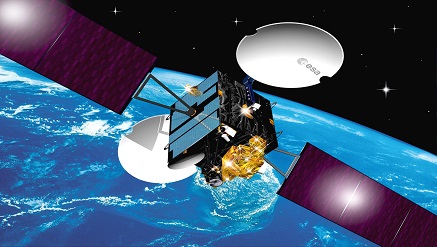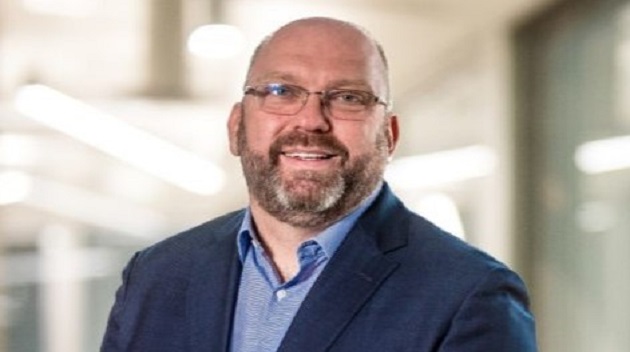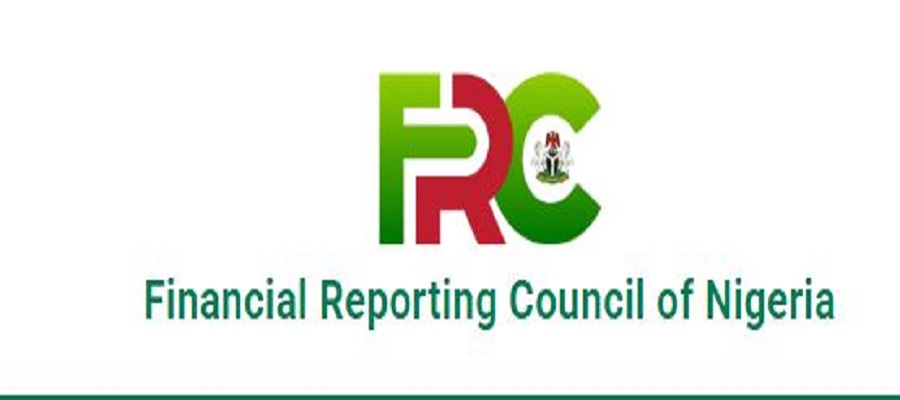General News
How Satellite Internet Could Weather Future Disasters

Greg Wyler, founder of the OneWeb satellite venture has said that his mission is to bring affordable Internet services to the entire globe — and that also means beefing up the connectivity for the first responders and survivors facing deadly disasters like Cyclone Pam.
That powerful storm ripped through the Pacific archipelago of Vanuatu this week, leaving widespread death and destruction in its wake.
Responding to the disaster has been difficult in part because the cyclone wiped out communication links. And that’s where satellite-based connectivity could be a life-saver, said Greg Wyler, OneWeb founder and CEO.
“Communications can come with the people servicing the area,” Wyler told NBC News on Monday. “They can bring their own infrastructure. You can enable people on the ground who already have a communication device to become part of the solution.”
OneWeb is just one of several ventures that hope to start delivering Internet and mobile services via satellite sometime in the next few years. But if Wyler’s venture stays on track, it could be one of the first to make it to the marketplace. He said the current schedule calls for launches to begin in 2017, with network activation in 2019.
The initial plan calls for a constellation of about 650 small satellites to be put into orbit, providing global data services at speeds of 50 megabits per second or faster. Wyler estimated the cost for the first phase of the venture at around $2 billion.
Some of the logistics for the network still have to be worked out — but many of OneWeb’s partnerships already have been put into place:
Virgin Galactic, founded by billionaire Richard Branson, will provide launch services. Wyler said other launchers would be used as well.
Qualcomm, a leader in wireless products and services, is working on the hardware.
Honeywell Aerospace said this month that it would provide aircraft equipment and airtime services for OneWeb’s network.
Rockwell Collins announced on Monday that it would work with OneWeb on satellite communication terminals for aircraft.
Wyler foresees a time when emergency teams could bring the Internet and phone services to the scene of a disaster on their helicopters, airplanes and trucks.
“The first responders in that environment would have mobile networks running regardless of the situation,” he said. “And for users on the ground, their cellphones and smartphones would still work to the extent that it was allowed. … We can change those survivors into supporters.”
OneWeb is planning to produce multi-user Internet terminals that could be installed on the roof of a home or school, as shown in this photo. Such terminals would be solar-powered, with a price tag in the range of $250, OneWeb founder Greg Wyler says.
Emergency response is just one of the potential applications for OneWeb, Wyler said. He envisions having terminals installed on commercial jets and private airplanes, in homes and in schools — and not just for the developed world, but also for the estimated 4 billion people who don’t have Internet access today.
OneWeb’s objective is to offer multi-user satellite terminals for less than $250, and work out deals with telecom providers to bring Internet services within reach of potential users in the developing world.
“Our mission is to enable affordable access for everyone,” Wyler said.
Airline travelers could benefit as well. Today’s in-flight networks generally put limits on streaming video or other high-bandwidth services, but Wyler said OneWeb’s aircraft terminals would change the equation.
This artist’s conception shows a compact Internet terminal installed on the roof of a Beechcraft airplane.
“This will allow an [Airbus] A380 to stream Netflix anywhere in the world,” Wyler said. “We are solving a big problem for emerging markets, which is literally half the world, and the other half is connected only intermittently.”
He acknowledged that other ventures — including SpaceX and Outernet — are also planning to offer satellite Internet services. But he doesn’t see them as threats.
“It’s best not to look at things in terms of being competitive, because the market is so large,” he said. “No one will solve 100 percent of the need. We’re really just making dents in the market.”
Wyler is delivering a keynote address at the Satellite 2015 conference in Washington on Tuesday.
General News
NCS to Launch Electronic System for Cash Declarations at Airports

Nigeria Customs Service (NCS) is set to introduce an electronic declaration system to streamline and enhance compliance for travelers carrying cash into or out of Nigeria.

Speaking in an interview with the News Agency of Nigeria (NAN) in Abuja, Abdullahi Maiwada, NCS spokesperson, emphasized that the initiative aligns with efforts to strengthen Nigeria’s anti-money laundering framework and reinforce financial regulations.
“The Nigeria Customs Service (NCS) has announced the deployment of an Electronic-Currency (E-Currency) declaration form as part of its anti-money laundering measures for travelers carrying cash into and out of Nigeria,” NAN reported. The system will require travelers carrying amounts exceeding the legal threshold to declare them before arrival or departure.
Maiwada further explained the process, stating, “We have developed a system where, even before leaving your point of origin, you can scan a QR code, access the form, fill it out, and we will be able to see it from here.”
He noted that the initiative, set for rollout soon, will enhance monitoring and facilitate information sharing with relevant authorities.
Under the Anti-Money Laundering (Prevention and Prohibition) Act 2022 and the NCS Act 2023, travelers carrying over $10,000 (about N15.4 million) or its equivalent in negotiable instruments must declare the funds to Customs authorities.
To boost awareness, the NCS is working with airline operators to inform travelers through onboard announcements and plans to reinstate signage at airports and border points in English and French.
The move comes as part of broader efforts to tighten financial controls following a recent case at the Murtala Muhammed International Airport (MMIA), where Customs officials seized $578,000 from a passenger attempting to evade currency declaration regulations.
General News
Aquaterra Energy Secures Multi-million-dollar well Intervention Contract with Intrepid Energy in Nigeria

Aquaterra Energy, a leader in offshore engineering solutions, has secured a multi-million-dollar, multi-year contract with Intrepid Energy Limited (IEL) to deliver a bespoke subsea well intervention equipment package for a project in Nigeria.

Aquaterra Energy’s turnkey well access package will enable IEL to conduct intervention operations across multiple mature oil wells in the region, supporting enhanced reservoir production.
The contract includes the supply of a complete seabed-to-surface intervention system and package, spanning from the subsea tree to surface intervention equipment.
Key components include Aquaterra Energy’s TRT tieback tooling, which provides production bore and annular access, a lightweight well pressure control system, and an ISO 13628-7 qualified open water intervention riser with an integrated tensioning system. In addition to equipment provision, Aquaterra Energy will also deliver ongoing offshore engineering support throughout the project.
The 7- 3/8” lightweight well access solution, has been specifically engineered for deployment from jack-ups and lift boats. This innovative approach offers a cost-effective and operationally efficient alternative to floating vessels, reducing intervention costs while maintaining high safety and performance standards.
Andrew McDowell, Delivery Director at Aquaterra Energy comments: “Our expertise in offshore engineering allows us to develop tailored intervention solutions that address the operational challenges of subsea well access.
This system has been engineered for efficiency, ease of deployment, and safety, helping IEL optimise intervention activities across Nigeria while reducing costs. By delivering a complete, integrated package, we are simplifying complex operations and enabling operators to maximise production potential.”
Engr Seun Alonge, CEO at Intrepid Energy Limited adds: “Working with Aquaterra Energy marks a significant step forward for our intervention operations in Nigeria. Their specialised technology enhances our ability to execute intervention programmes efficiently, maximising performance across our assets.
By combining Aquaterra’s technical expertise with our deep understanding of the local operating environment, we’re confident this collaboration will enhance production outcomes and create lasting value for our operations in the region.”
The project is set to support intervention operations over multiple years, with Aquaterra Energy providing ongoing technical expertise, with a dedicated team of engineers providing ongoing service support throughout the project.
George Morrison, CEO at Aquaterra Energy: “Delivering reliable and efficient well access solutions for shallow water subsea operations is central to how we support offshore operators.
This collaboration with IEL reinforces our commitment to providing cutting-edge engineering solutions that enhance efficiency and reduce operational costs. With West Africa playing an important role in the global energy sector, we’re proud to continue supporting its offshore industry with our expertise and innovative technologies.”
General News
FG Halts Controversial FRC Dues amid Industry Outcry

Federal government has temporarily suspended the controversial annual dues imposed on public interest enterprises by the Financial Reporting Council (FRC) after fierce opposition from businesses.

Jumoke Oduwole, minister, Industry, Trade, and Investment, announced the decision during a Ministerial Consultative Meeting in Abuja on Wednesday.
The move follows mounting pressure from private sector groups, including the Nigeria Employers’ Consultative Association (NECA) and the Manufacturers Association of Nigeria (MAN), who slammed the Financial Reporting Council (Amendment) Act 2023 for burdening companies with excessive fees.
The Act mandates cumulative annual charges for non-listed entities and imposes a harsh 10% monthly penalty on unpaid dues, compounding until full payment, a provision that sparked widespread backlash.
At the meeting, major industry players like NECA, MAN, the Nigerian Association of Chambers of Commerce (NACCIMA), oil producers, and telecom operators warned that the fees would cripple businesses already struggling in a tough economy.
Oduwole clarified the suspension, stating, “The government has decided to direct the Financial Reporting Council to pause in the implementation of the new annual dues. You know that I am a lawyer, and a suspension request by the organised private sector would be in contravention of legislation duly passed by the National Assembly. A pause is an administrative process simply to review, in line with what we discussed today.”
She assured stakeholders that the halt would last no longer than 60 days, with a technical working group—including FRC officials and private sector representatives—set up to reassess the policy.
“We are a listening administration. The private sector has requested a range from three months to an indefinite suspension. We are not going to do that. So, at the most, 60 days is in my estimate. We are going to set up a technical working group comprised of the FRC and the organised private sector who have formally written in, and this will be reviewed,” Oduwole emphasized.

 Telecom3 days ago
Telecom3 days agoAgain, Labour Fumes, Threatens Shutdown of Telcos over Non-Implementation of 15 Percent Tariff Reduction

 News3 days ago
News3 days agoNNPC Ready to Go to Capital Market for IPO- CFIO

 E-Business3 days ago
E-Business3 days agoFG Launches Online Visa Approval Centre

 E-Business3 days ago
E-Business3 days agoQNET Disassociates From Fraudulent Academy in Abuja, Supports EFCC Arrest

 Telecom2 days ago
Telecom2 days agoIHS Nigeria Hosts Telecom Industry Stakeholders to Discuss Protection of Critical National Infrastructure in Lagos State

 E-Financial2 days ago
E-Financial2 days agoTitan Trust Bank Selects Oracle FSS for Core and Digital Banking Technology

 General News2 days ago
General News2 days agoNCS to Launch Electronic System for Cash Declarations at Airports

 News2 days ago
News2 days agoSanwo-Olu Hails Jumia for Giant Strides in Growing Nigeria’s E-Commerce Sector














